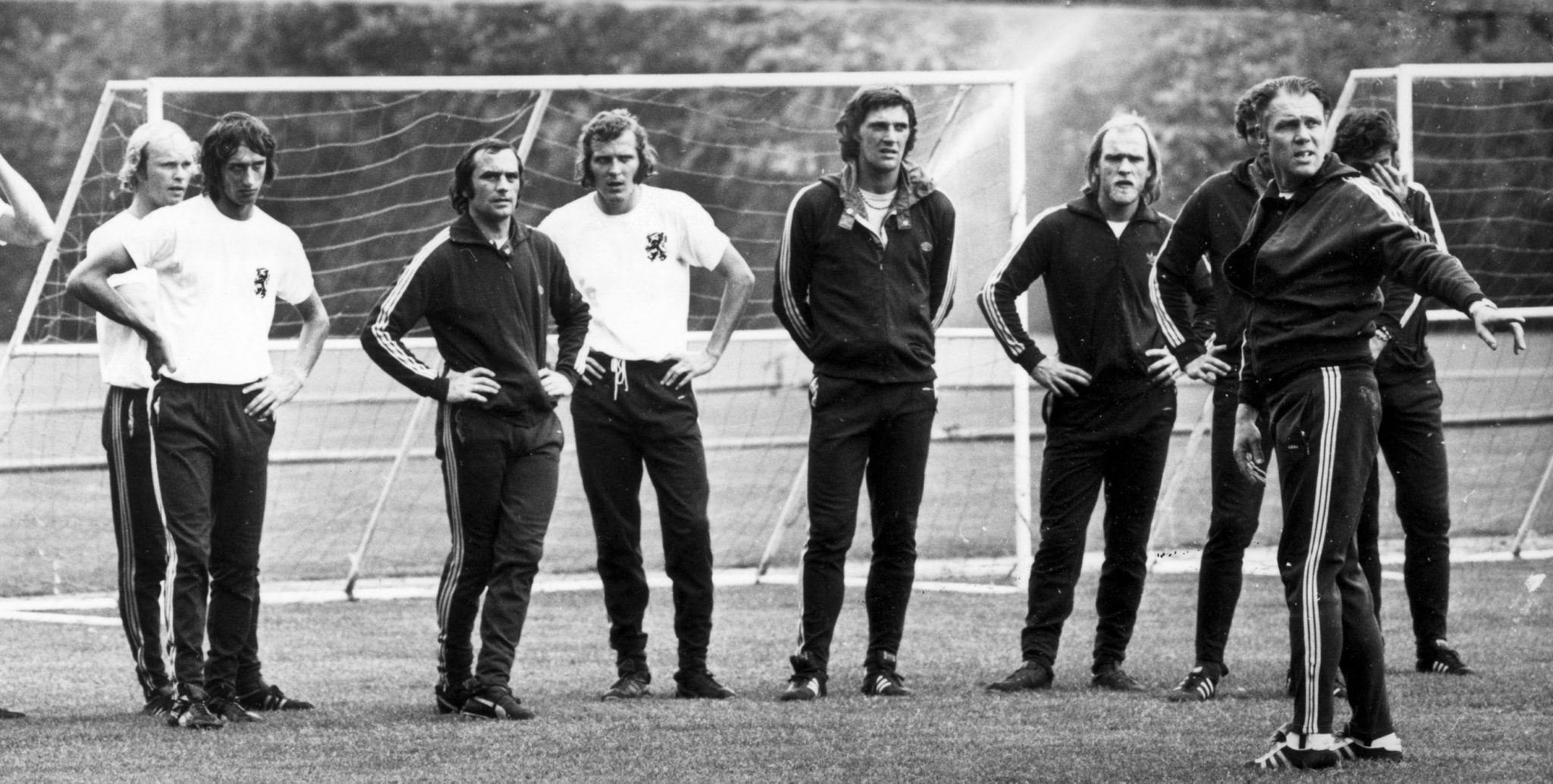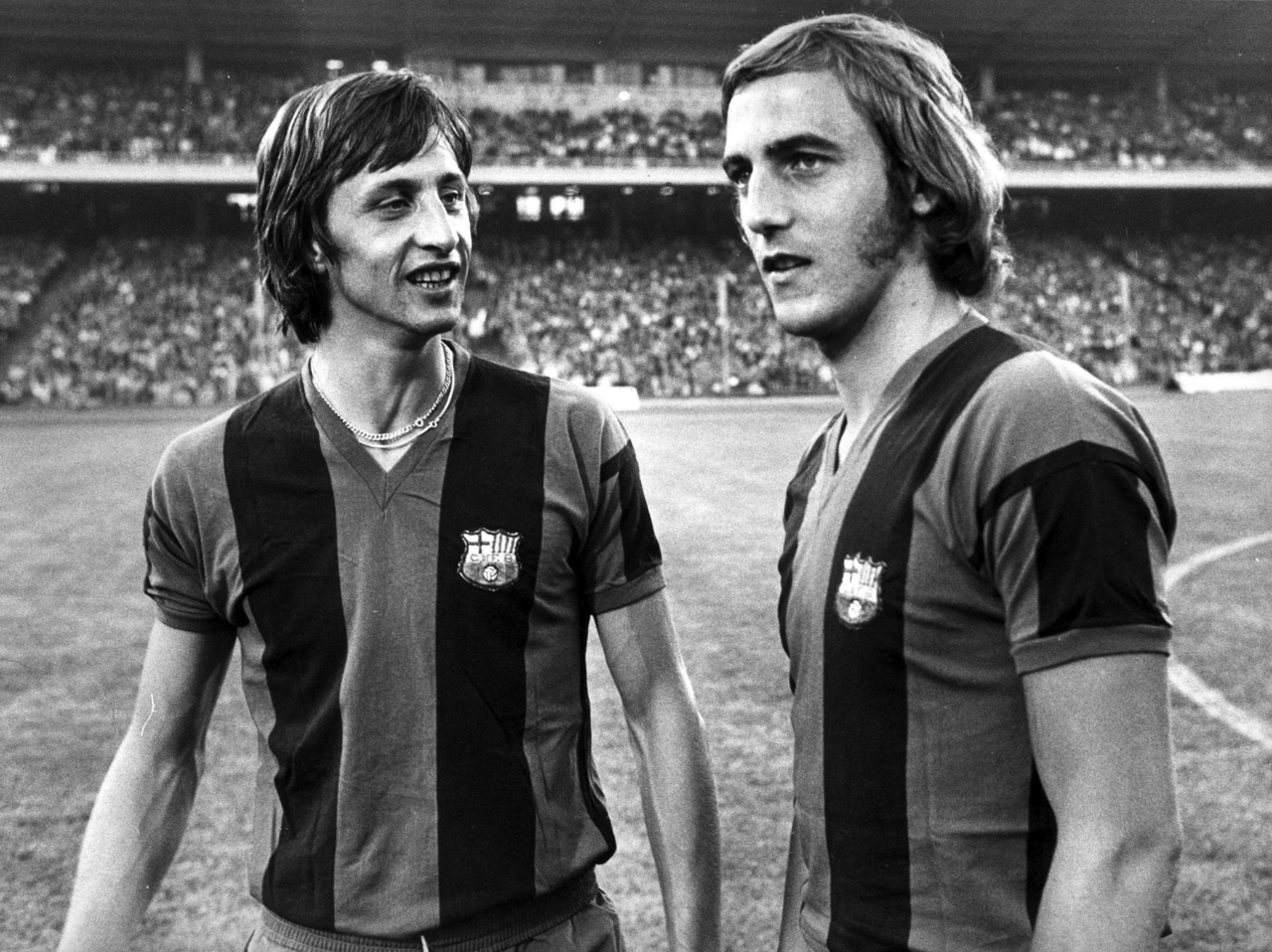The early seventies were a great time for Dutch football. Following Feyenoord’s European Cup win against Celtic in 1970, Ajax won that same competition three years running to put Dutch club football on top of the European and probably world tree.
As the 1973/74 season began, it was a time of change. Johan Cruijff had fallen out with his Ajax teammates and took the first train to Barcelona to link up with his erstwhile mentor Rinus Michels and achieve success at the first attempt by winning La Liga.
More exciting times were just around the corner as – for the first time since 1938 – Holland had qualified for the World Cup finals in 1974, to be held in West Germany. As a twelve year old, reared on traditional English hard men such as Norman Hunter, Billy Bremner and Jack Charlton, with haircuts you could set your clock by, the appearance of what looked like the Grateful Dead at the tournament made us feel that football had gone all rock and roll! What’s more, we had a colour television and the chance to see top-flight international football was one that didn’t come round very often – we had to make do with European club football highlights on Wednesday nights. It certainly wasn’t the 24-hours-a-day, seven-days-a-week feeding frenzy we have now.

READ: Rinus Michels and the birth of top-club Ajax
As was the case with the previous World Cup, pre-tournament preparations began with the collection of a Panini sticker album. Whilst I was extremely pleased with the fact that I managed to collect the entire 400 glossy rectangles that made up the set, I was less proud of the way I managed to secure the final piece of the jigsaw (the Chile federation badge, fact fans). I had promised my friend all my swaps if he would take the coveted sticker from his album but failed miserably to fulfil my side of the bargain. Ten years later he was best man at my wedding, so no grudges were held.
The sixteen-team competition was an exciting blend of the usual favourites – Brazil, Italy and West Germany, mysterious Eastern Europeans – Yugoslavia, Bulgaria, stereotypical thuggish South Americans – Argentina and Uruguay, outsiders from far and wide – Zaire and Haiti plus Holland. The squad suffered a shock before the tournament began, losing the marvelous stopper Barry Hulshoff and midfielder Gerrie Mühren to injury which meant that Arie Haan had to be shifted to centre back to partner with the inexperienced Wim Rijsbergen of Feyenoord. In all, there were six Ajacieden in the squad (Haan, Keizer, Krol, Neeskens, Rep, Suurbier plus of course, Cruijff).
The Dutch were drawn in Group 3, alongside Uruguay, Sweden and Bulgaria. The tournament kicked off on Thursday 13th June, with the traditional goalless draw between holders Brazil and Yugoslavia, but we had to wait until Saturday teatime before we got our first look at the Dutch. As Johan Cruijff says in his autobiography, the first period of the match was a bit of a feeling out process before they realized that their South American opponents, whilst tough and uncompromising, were playing football that was outdated and ineffective against the modern, dynamic approach of total football.
READ: Johan Neeskens – “The second greatest player in the world”
I mentioned earlier that the Uruguayans were stereotypical in their approach but stereotypes are based on truisms and these lads did not disappoint. As well as adopting an “if-it-moves-kick-it” approach, they alienated the press by demanding money for interviews, had a player (Luis Garisto) who had prevented Aussie star Ray Baartz from playing in the tournament by felling him with a karate chop and pretty much deserved what they got: nothing. Johnny Rep scored twice, as Diego Forlán’s dad Pablo tried to add murder to his rap sheet but it was Juan Montero Castillo who was sent off for punching Rob Rensenbrink in the stomach.
Next up was Sweden, an excellent team with two superb strikers in Ralf Edström (PSV) and Roland Sandberg. A goalless draw was played out but this match was memorable for the unveiling of the Cruijff turn, as Johan left Swedish defender Jan Olsson with twisted blood. Qualification for the next stage was assured with a 4-1 routing of Bulgaria, Neeskens bagging a brace with Rep and Theo De Jong also scoring. Even Bulgaria’s consolation goal was scored by the Dutch, Krol putting through his own goal.
Instead of heading for a knock-out stage, this tournament featured a second round of two four-team groups, with the winner of each pool to meet in the final. With both Brazil and Holland beating East Germany and Argentina, the stage was set for a “semi-final” showdown in Dortmund. This really was the game that had everything – in fact, it’s probably my favourite match of all time. It was end to end, battles broke out all over the pitch, Holland scored two superb goals, Rinus Israel, the Dutch enforcer, rubbed his hands with glee as he came on for Neeskens (who had been knocked unconscious by Mario Marinho) desperate to add a few Brazilians to his hit list and finally Luis Pereira was sent off for yet another foul on the Dutch midfielder. And so to the final. Against West Germany.
As we excitedly gathered around the television on Sunday, on 7th July, the general feeling was that Holland just had to turn up and the trophy was theirs. In hindsight, the West German team was excellent, containing six players from current European Cup holders Bayern Munich – Sepp Maier, Hans-Georg Schwarzenbeck, Franz Beckenbauer, Paul Breitner, Uli Hoeness and Gerd Müller. There has been a lot of speculation that German prostitutes had kept the Dutch squad up (excuse the pun) the night before the match, this tale even inspiring a play, but the alleged participants have denied this ever happened. The game was dramatic from the kick-off – 16 passes culminated in a clumsy challenge on Cruijff by Hoeness followed by a penalty converted by the reliable Neeskens. The Germans equalised with a penalty of their own before Müller scored what proved to be the winner just before half time. Rep could have scored before Müller, with him and Cruijff through on keeper Maier, but the shot was saved and Holland would never have a better chance.
After the game a banquet was arranged for the participants, but big Willem van Hanegem refused to attend as he had lost many members of his family during the German occupation of World War 2.
Let’s not end on a negative though – I loved every minute of this tournament – Yugoslavia banging in nine goals against hapless Zaire, Italy going 1-0 down to Haiti, Johan Cruijff customising his kit due to his Puma sponsorship (we all wanted Puma Cruyff boots) but above all the magnificent total football played by those Oranje-shirted heroes that enthralled this 12 year old boy and still works it’s magic on this 55 year old man today!
